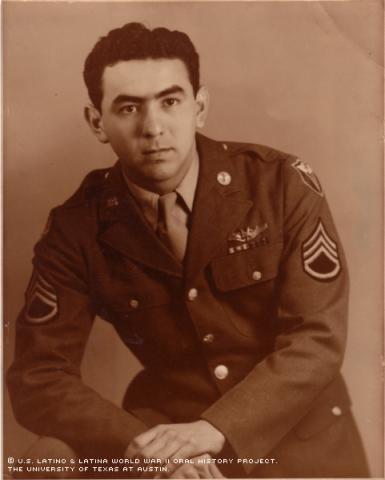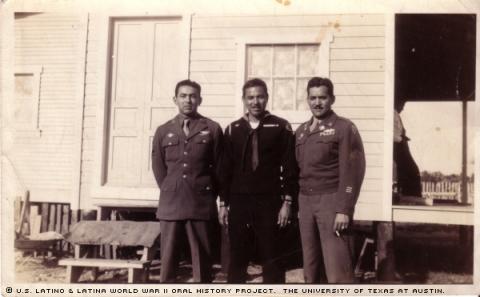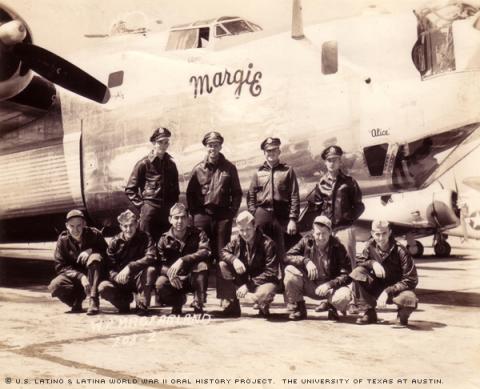


By Caleb Pritchard
During his 22 months in the Army Air Forces, Joe Hernandez survived a remarkable 35 bombing missions in World War II Europe as the top turret gunner on a B-24 Liberator heavy bomber.
Hernandez remembered how he and other men in his unit, the 93rd Bombardment Group in the 8th Air Force became accustomed to the reverberations of exploding flak that would regularly meet them when they neared a target. On three different occasions, the flak damaged the aircraft enough to require Hernandez to make emergency landings in Allied territory.
“It was like driving on a bumpy road,” said Hernandez, describing the concussions from flying through the flak.
In addition to having to be wary of enemy fire, the pilots had to be mindful of the rigors of flying in tight formation. Hernandez said his closest brush with death came when his craft was caught in the propeller wash -- the violent turbulence created by propellers -- of another bomber in their squadron. The whirlwind disturbance in the air put Hernandez and his crew in a tailspin.
“The pilot gave the order to bail out, but there was so much centrifugal force of the plane spinning that it restricted our movements,” Hernandez recalled. Because his movement was restricted, he was unable to access his chest-type parachute.
However, after the plane plunged about 5,000 feet, the pilot was able to regain control and landed safely. At the time they were carrying a load of 20 bombs that weighed 250 pounds each.
Finally, on Feb. 22, 1945, Hernandez’s 21st birthday, he flew his last mission before being returning to the U.S. on the ocean liner Queen Mary in late March 1945. He spent several days on R&R. He later became an aerial gunnery instructor at Gowen Field in Boise, Idaho, where he stayed until the war ended.
*******It was a long way back to his hometown of San Antonio, Texas, to where his parents, Mexican immigrants seeking refuge from the revolution that rocked their country in the early 20th century, had moved in 1914. Hernandez’s parents, Enrique Hernandez and Carlota Garza
Hernandez, spoke Spanish in the home. But by the time he went to school, Hernandez said he had picked up enough English from the radio to get by.
Hernandez dropped out of school one year shy of graduating in order to help supplement his parents’ restaurant business. After the war he earned his GED. He held a number of jobs, including one as part of a clean-up crew and supplier with the famed Pullman Car Company. Then, he and his older brother, Enrique G. Hernandez, were both drafted into the armed forces in 1943, during the height of the war.Two other brothers also served in the military. Rudy G. Hernandez was in the Navy and Raul G. Hernandez served in the Army.
*******Hernandez underwent basic training outside of Denver, Colo., before attending an air gunnery school in Laredo, Texas. Once assigned to a crew with the 93rd Bombardment Group in the 8th Air Force in Lincoln, Neb., Hernandez endured an 18-hour flight to the European Theater by way of Iceland.
Hernandez and his crew launched all 35 of their bombing raids over Germany from the fall of 1944 to the winter of 1945. The raids were launched from Harwick, a small town north of London.
He was honorably discharged Oct. 18, 1945, at the rank of staff sergeant. For his service, he earned an Air Medal with five Oak Leaf Clusters, a Good Conduct Medal and the European Theater of Operations Ribbon with three battle stars for campaigns in Northern France, the Rhineland and the Ardennes (the Battle of the Bulge).
At the time of his interview, Hernandez had been married for 51 years to Aurora Zapata Hernandez. They had five children. The oldest, Christine Hernandez, served in the Texas Legislature as a state representative from 1991-1999. She also served on the San Antonio Independent School District board of trustees from 1986-1991, and as regional director of Region IV for the U.S. Department of Health and Human Services, from 2000-2001.
Hernandez noted he was eligible to return to service during the Korean War, but that the option did not appeal to him.
“One war was enough for me,” Hernandez said. “Why push it?”
Mr. Hernandez was interviewed in San Antonio, Texas, on July 19, 2004, by Brenda Sendejo.

